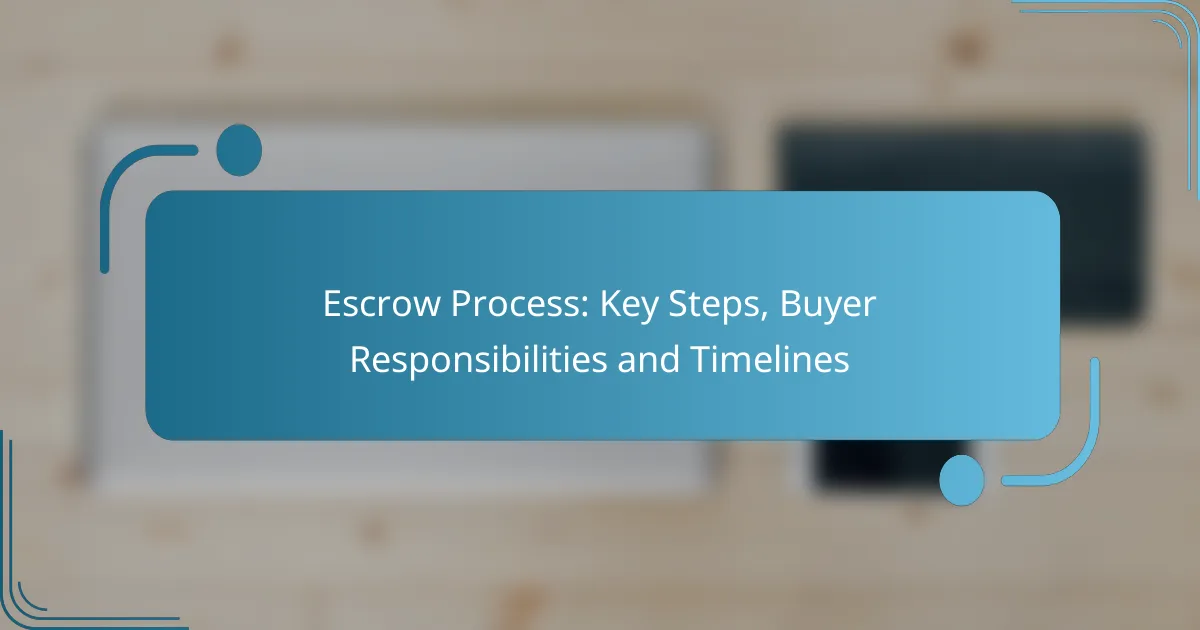Contingencies play a vital role in real estate transactions by offering buyers essential protections against unforeseen circumstances. These clauses enable buyers to withdraw from a deal or renegotiate terms based on specific conditions, safeguarding them from unfavorable agreements and financial losses. Understanding the types and importance of contingencies is crucial for making informed decisions in the buying process.
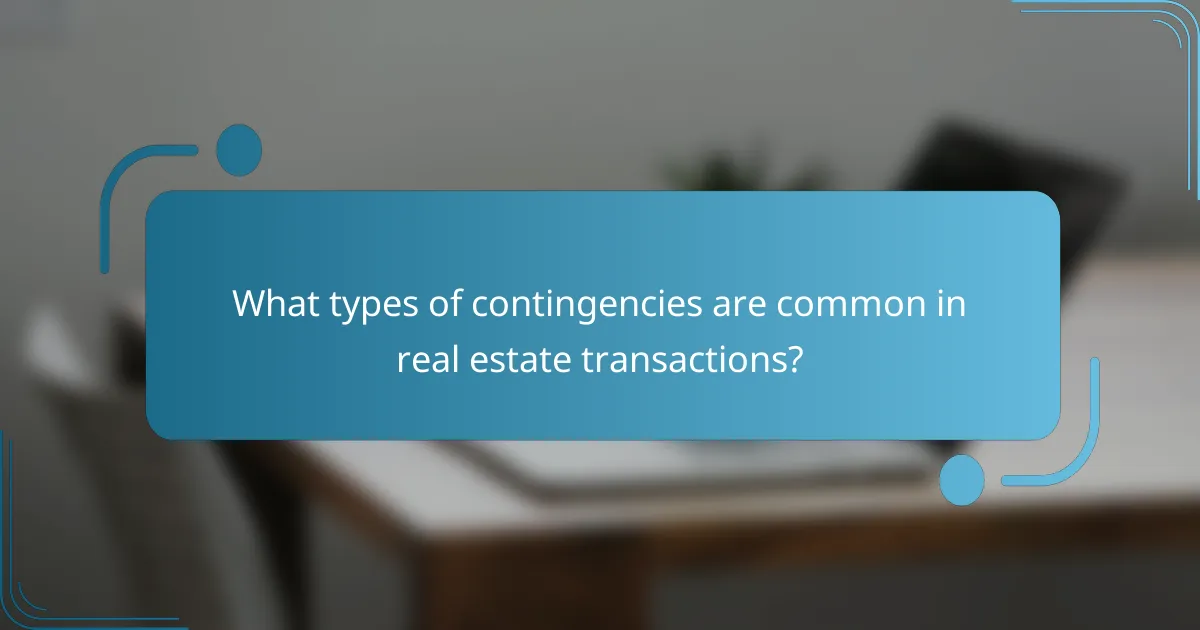
What types of contingencies are common in real estate transactions?
Common contingencies in real estate transactions include financing, inspection, appraisal, sale of current home, and title contingencies. These clauses protect buyers by allowing them to back out of the deal under specific conditions, ensuring they are not locked into unfavorable agreements.
Financing contingency
A financing contingency allows buyers to cancel the purchase if they cannot secure a mortgage or loan within a specified timeframe. Typically, this period lasts from a few weeks to a month, depending on the agreement.
Buyers should ensure they have pre-approval before making an offer, as this can strengthen their position. If financing falls through, buyers must provide proof to exercise this contingency without penalties.
Inspection contingency
The inspection contingency permits buyers to have the property professionally inspected and to negotiate repairs or price adjustments based on the findings. This contingency usually lasts for a week or two after the offer is accepted.
Buyers should be prepared for potential issues that may arise during inspections, such as structural problems or pest infestations. It’s wise to include a clause that allows for renegotiation or cancellation if significant issues are discovered.
Appraisal contingency
An appraisal contingency protects buyers by ensuring the property is valued at or above the purchase price by a licensed appraiser. This is crucial for securing financing, as lenders typically require an appraisal.
If the appraisal comes in lower than expected, buyers can negotiate a lower price or walk away without losing their earnest money. Understanding local market conditions can help buyers anticipate appraisal outcomes.
Sale of current home contingency
This contingency allows buyers to make an offer contingent on the sale of their current home. If the home does not sell within a specified timeframe, the buyer can withdraw from the purchase without penalties.
Buyers should be cautious with this contingency, as it can make their offer less attractive to sellers. It’s advisable to have a strong marketing plan for the current home to facilitate a quicker sale.
Title contingency
A title contingency ensures that the property has a clear title, free from liens or disputes. Buyers can back out of the deal if issues arise during the title search.
It’s essential for buyers to work with a reputable title company to conduct this search. Understanding local title laws can also help buyers navigate potential complications effectively.

Why are contingencies important for buyers?
Contingencies are crucial for buyers as they provide essential protections during real estate transactions. They allow buyers to back out or renegotiate terms based on specific conditions, reducing potential risks and financial losses.
Risk mitigation
Contingencies help buyers mitigate risks associated with purchasing a property. Common contingencies include home inspections, financing approvals, and appraisal conditions. These clauses enable buyers to identify issues or secure funding before fully committing to the purchase.
For instance, a home inspection contingency allows buyers to withdraw their offer if significant problems are discovered, such as structural damage or pest infestations. This safeguard prevents buyers from investing in properties that could lead to costly repairs down the line.
Financial protection
Financial protection is a key benefit of contingencies, as they can prevent buyers from facing unexpected expenses. A financing contingency ensures that buyers can secure a mortgage before finalizing the sale, protecting them from losing their deposit if they cannot obtain funding.
Additionally, appraisal contingencies can protect buyers from overpaying for a property. If the appraisal comes in lower than the purchase price, buyers can negotiate a lower price or exit the deal without financial penalties.
Negotiation leverage
Contingencies provide buyers with negotiation leverage during the purchasing process. By including specific conditions, buyers can negotiate repairs or price reductions based on the findings of inspections or appraisals. This can lead to more favorable terms and a better overall deal.
For example, if an inspection reveals necessary repairs, buyers can request that the seller address these issues before closing or adjust the sale price accordingly. This leverage can be particularly valuable in competitive markets where buyers need to stand out.
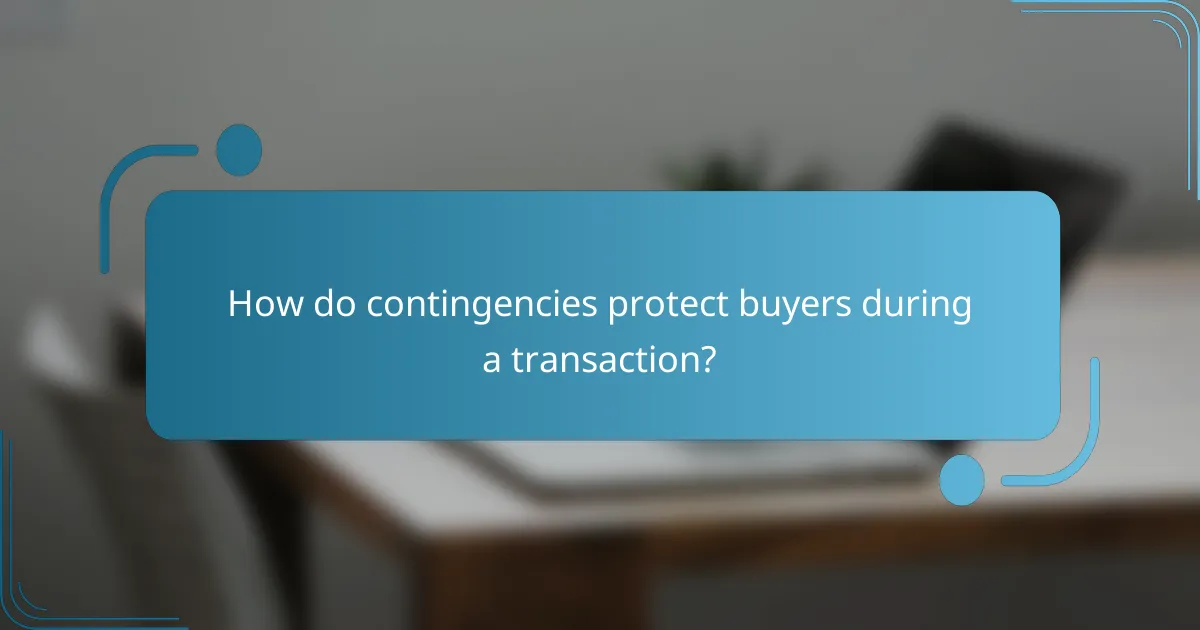
How do contingencies protect buyers during a transaction?
Contingencies are clauses in a purchase agreement that allow buyers to back out of a transaction under specific conditions, providing essential protection. They ensure that buyers can make informed decisions and avoid potential pitfalls during the buying process.
Ensures property condition
Contingencies related to property condition typically require the seller to address any issues identified during a home inspection. Buyers can include clauses that allow them to negotiate repairs or request credits if significant problems arise, such as structural damage or outdated systems.
For example, if an inspection reveals a faulty roof, the buyer can request repairs or a reduction in the purchase price to account for the necessary work. This protects buyers from unexpected expenses after closing.
Secures financing
Financing contingencies protect buyers by ensuring they can secure a mortgage before finalizing the purchase. This clause allows buyers to withdraw from the agreement if they cannot obtain financing within a specified timeframe, typically 30 to 60 days.
Buyers should ensure that their financing contingency includes a clear timeline and conditions under which they can back out, preventing them from being locked into a deal they cannot afford. This is especially crucial in fluctuating markets where interest rates may change rapidly.
Prevents buyer’s remorse
Contingencies can help prevent buyer’s remorse by allowing buyers to reconsider their decision based on specific conditions. For instance, a buyer may include a contingency that allows them to withdraw if they are unable to sell their current home within a certain period.
This type of clause provides a safety net, enabling buyers to make decisions without the fear of being stuck in a transaction that no longer suits their needs. It is essential to clearly define the terms of these contingencies to ensure they are enforceable and protect the buyer’s interests effectively.
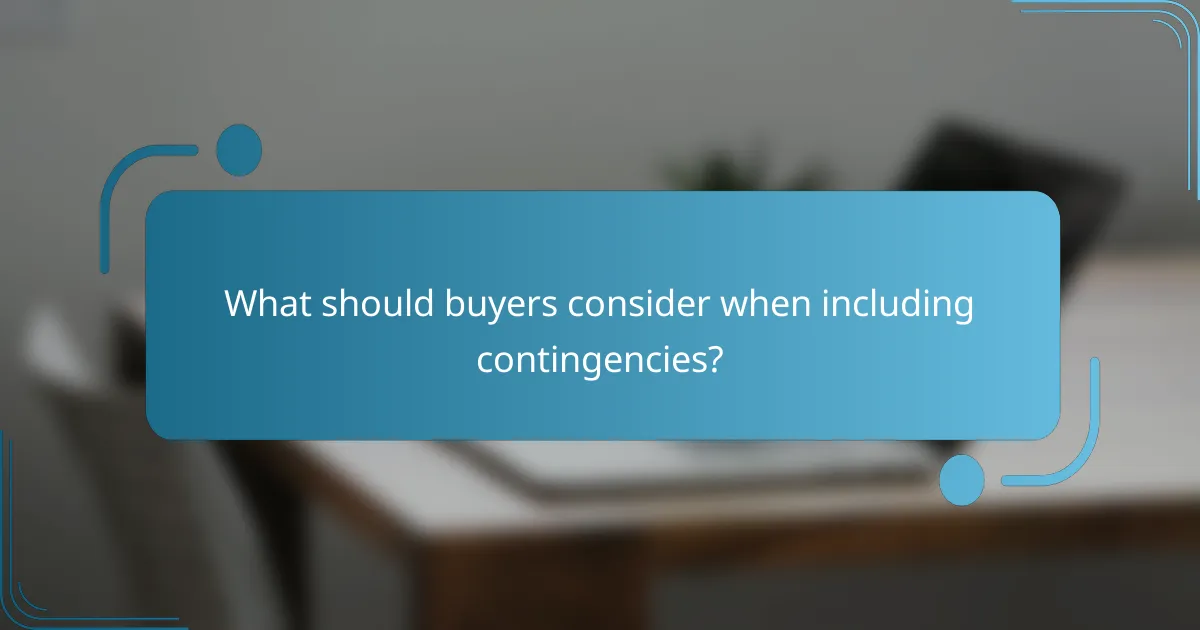
What should buyers consider when including contingencies?
Buyers should carefully evaluate contingencies to protect their interests during a property transaction. Key considerations include market conditions, the seller’s willingness to negotiate, and any time constraints that may affect the deal.
Market conditions
Understanding current market conditions is crucial when including contingencies. In a seller’s market, where demand exceeds supply, buyers may face challenges in negotiating favorable terms. Conversely, in a buyer’s market, there may be more room to include contingencies without risking the deal.
For instance, if the market is competitive, buyers might consider limiting contingencies to make their offers more appealing. However, in a softer market, they can afford to include more extensive protections, such as inspection or financing contingencies.
Seller’s willingness
The seller’s willingness to accept contingencies can significantly impact the negotiation process. Some sellers may be open to including various contingencies, while others may prefer a straightforward offer without conditions. Understanding the seller’s motivations can help buyers tailor their offers effectively.
For example, if a seller is eager to close quickly, they might be less inclined to accept contingencies that extend the timeline. Buyers should assess the seller’s situation and adjust their contingency requests accordingly to enhance their chances of acceptance.
Time constraints
Time constraints can influence the types of contingencies a buyer can realistically include. If a buyer needs to close quickly due to personal circumstances, they may opt for fewer contingencies to expedite the process. On the other hand, if there is more flexibility, they can include additional protections.
Buyers should clearly communicate their timelines and discuss them with their agents to align expectations. Creating a checklist of essential contingencies based on urgency can help streamline the decision-making process and avoid potential pitfalls during negotiations.
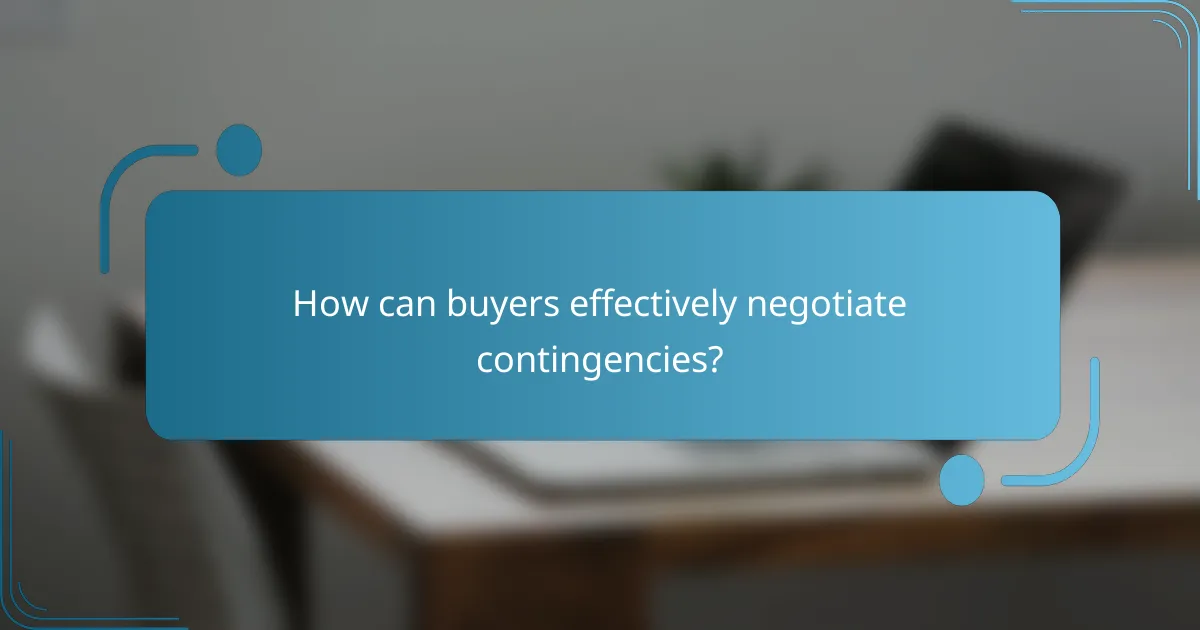
How can buyers effectively negotiate contingencies?
Buyers can effectively negotiate contingencies by clearly understanding their needs and leveraging expert advice. This involves consulting with real estate professionals, analyzing local market conditions, and identifying which contingencies are most critical for their situation.
Consult with real estate agents
Engaging with experienced real estate agents is crucial for buyers looking to negotiate contingencies. Agents can provide insights into common practices in the local market and help buyers formulate strategies that align with their goals.
For example, an agent might suggest including a financing contingency to ensure the buyer can secure a mortgage before finalizing the purchase. This protects the buyer from losing their deposit if they cannot obtain financing.
Understand local market trends
Being aware of local market trends enables buyers to make informed decisions regarding contingencies. Buyers should research whether the market is favoring buyers or sellers, as this can influence the negotiation process.
In a competitive market, buyers might need to limit contingencies to make their offers more appealing. Conversely, in a buyer’s market, they may have more leverage to negotiate favorable terms, such as extended inspection periods.
Prioritize essential contingencies
Buyers should prioritize contingencies that are essential for their peace of mind and financial security. Common contingencies include inspection, appraisal, and financing clauses, which protect buyers from unforeseen issues.
It’s advisable to create a list of must-have contingencies versus those that are negotiable. For instance, a buyer may insist on an inspection contingency while being flexible on the closing date, ensuring they protect their investment without alienating the seller.

What are the potential risks of having too many contingencies?
Having too many contingencies can complicate real estate transactions and lead to delays or even deal cancellations. Excessive contingencies may create uncertainty for sellers and can weaken a buyer’s position in negotiations.
Complexity in Transactions
Each contingency adds a layer of complexity to a transaction, making it harder for all parties to understand the terms and conditions. This can lead to miscommunication and potential disputes, as different stakeholders may interpret contingencies differently.
For example, if a buyer includes multiple contingencies related to financing, inspections, and appraisals, it can overwhelm sellers who may prefer simpler offers. This complexity can result in longer closing times and increased frustration for everyone involved.
Impact on Negotiations
Too many contingencies can weaken a buyer’s negotiating power. Sellers often prefer offers with fewer contingencies, viewing them as more straightforward and less risky. A buyer with a lengthy list of contingencies may be perceived as less committed or more difficult to work with.
In competitive markets, a streamlined offer with minimal contingencies can stand out. Buyers should carefully assess which contingencies are essential and consider waiving non-critical ones to strengthen their position.
Potential for Deal Cancellations
Excessive contingencies increase the likelihood of deal cancellations, as buyers may find it challenging to meet all conditions. If a buyer fails to satisfy a contingency, they risk losing their earnest money deposit and damaging their reputation in the market.
For instance, if a buyer includes a contingency for the sale of their current home, delays in that sale could jeopardize the new purchase. Buyers should evaluate the necessity of each contingency and prioritize those that protect their interests without jeopardizing the deal.








